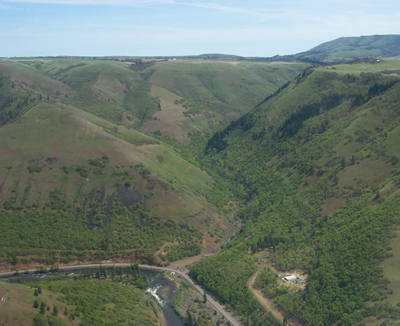KWEP
Habitat Site:
Improve Farming Practices (No-Till Drill Acquisition)
 Location:
Central and Eastern Klickitat County agricultural lands
Location:
Central and Eastern Klickitat County agricultural lands
Status: completed
Project Description: Increase residual ground cover (stubble) in agricultural
fields between crop cycles and reduce disturbance to the soil profile. The
net result is greater infiltration of precipitation into the soil profile
and less surface runoff and soil erosion. This project targets smaller farmers
(typically 80 ac or less) for whom it is not economical to purchase such equipment.
Limiting Factors addressed:
Increased fine sediment
Project rationale: Agricultural sources in the watershed are a substantial
contributor of fine sediment since most fields typically lack cover crops
and the fields are bare through at least half of the wet season. No-till (a.k.a.
"direct seed") drills are farm implements that effectively seed a crop without
tilling the ground. The practice is well-suited for grain crops (e.g. wheat)
which are the predominant crop in the area. CEKCCD estimates that 6-10 landowners
on roughly 300 acres will participate in the first year with increased landowner
participation in subsequent years.
Biological objective:
1. Increase abundance and productivity of steelhead